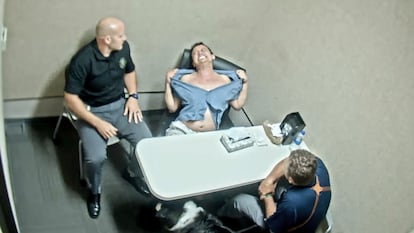California city pays $900,000 settlement after forcing a man to confess to a crime that never happened
Thomas Perez was ‘psychologically tortured’ by Fontana police for 17 hours after he called in to report his father missing. Detectives told the suspect his dad was dead even though he had been found alive and well


The city of Fontana, in California, will compensate Thomas Perez Jr. with nearly $900,000 after the man was “psychologically tortured” by detectives from this city east of Los Angeles. Perez’s nightmare began in August 2018, when he called the authorities to report the disappearance of his 71-year-old father after a family argument. The officers did not believe him and made him the main suspect instead. Detectives extracted a confession from him after a 17-hour interrogation in which Perez broke down. The problem? There was no such crime. His father was alive and well.
Jerry Steering, Perez Jr.’s attorney, told CBS News that it was “the worst act of deliberate cruelty that I’ve seen suing the police for 40 years. After I watched the video and watched the interrogation of Tom Perez, what I divined is that they could get you and I to confess to killing Abe Lincoln if they wanted to.”
Scenes of the interrogation have been seen around the world and have become a new example of police excesses in the United States. From a corner of the ceiling, the camera captures Perez sitting at a table in the interrogation room. On the other side, there are two detectives interrogating him insistently and even lying:
-"We just told you that we found your dead dad's body, and you don't give a shit," one of the police officers tells Perez.
-”You murdered your dad... Daddy is dead and it’s your fault,” the other detective adds minutes later.
-”No, I didn't,” Perez answers.
The pressure leaves its mark on Perez as the hours go by. The cameras capture how the man bursts into tears, at another time he pulls at his hair in a gesture of desperation, scratches his face and tears his own shirt. When detectives leave the room, the man tries to hang himself with the drawstring of his pants, the federal lawsuit states.
The agents sought to extract a confession from him in several ways. At one point they used Margo, the family dog, which had gone for a walk with the missing man hours before. The pet returned home alone and that is what caused Thomas to call the police. The detectives told Perez that the dog had witnessed the crime and followed the trail of blood, triggering a worried reaction from Perez. After the 16th hour, Perez, who had not had his medication for depression and other mental health problems, told the police that he stabbed his father after an argument.
His father had actually slept at his girlfriend's house near Union Station. He had left his cell phone and wallet in the house he shared with his son. These were found after a search of the home, along with some traces of what looked like blood. According to the Police Department, a police dog smelled traces at the scene that could correspond to “human remains.”
The morning of his alleged disappearance, the suspect’s father took a flight from Los Angeles Airport to northern California, where his daughter lives. When police learned that the man was alive and well, they withheld the information from Thomas Perez, who was under psychiatric surveillance.
In his lawsuit against the city of Fontana, Thomas Perez Jr. names officers David Janusz, Jeremy Hale, Ronald Koval, Robert Miller and Joanna Piña as responsible for his mistreatment, as they denied him his medications and prevented him from sleeping. A federal district judge agreed with him, considering that any member of the jury could conclude that “unconstitutional psychological torture was inflicted on Perez.” The city of Fontana has not said whether the detectives have been suspended or remain part of the police force.
Sign up for our weekly newsletter to get more English-language news coverage from EL PAÍS USA Edition
Tu suscripción se está usando en otro dispositivo
¿Quieres añadir otro usuario a tu suscripción?
Si continúas leyendo en este dispositivo, no se podrá leer en el otro.
FlechaTu suscripción se está usando en otro dispositivo y solo puedes acceder a EL PAÍS desde un dispositivo a la vez.
Si quieres compartir tu cuenta, cambia tu suscripción a la modalidad Premium, así podrás añadir otro usuario. Cada uno accederá con su propia cuenta de email, lo que os permitirá personalizar vuestra experiencia en EL PAÍS.
¿Tienes una suscripción de empresa? Accede aquí para contratar más cuentas.
En el caso de no saber quién está usando tu cuenta, te recomendamos cambiar tu contraseña aquí.
Si decides continuar compartiendo tu cuenta, este mensaje se mostrará en tu dispositivo y en el de la otra persona que está usando tu cuenta de forma indefinida, afectando a tu experiencia de lectura. Puedes consultar aquí los términos y condiciones de la suscripción digital.








































